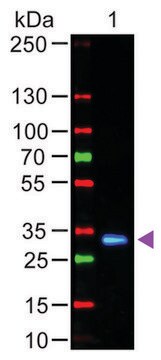SAB4200708
Anti-Proliferating Cell Nuclear Antigen antibody, Mouse monoclonal
clone PC 10, purified from hybridoma cell culture
Sinonimo/i:
Anti-ATLD2, Anti-Cyclin, Anti-PCNA
About This Item
Prodotti consigliati
Origine biologica
mouse
Livello qualitativo
Forma dell’anticorpo
purified from hybridoma cell culture
Tipo di anticorpo
primary antibodies
Clone
PC 10, monoclonal
Forma fisica
buffered aqueous solution
PM
antigen ~36 kDa
Reattività contro le specie
monkey, rat, insect, mouse, yeast, human
Concentrazione
~1.0 mg/mL
tecniche
ELISA: suitable
flow cytometry: suitable
immunoblotting: 0.5-1 μg/mL using human foreskin fibroblast HS-68 cell line extract
immunofluorescence: 1.25-2.5 μg/mL using HeLa cells
immunohistochemistry: 10 μg/mL using heat-retrieved formalin-fixed, paraffin-embedded human Tonsil sections.
immunoprecipitation (IP): suitable
Isotipo
IgG2a
N° accesso UniProt
Condizioni di spedizione
dry ice
Temperatura di conservazione
−20°C
modifica post-traduzionali bersaglio
unmodified
Informazioni sul gene
human ... PCNA(5111)
Descrizione generale
Specificità
Immunogeno
Applicazioni
- enzyme-linked immunosorbent assay (ELISA)
- immunoblotting
- flow cytometry
- immunohistochemistry
- immunoprecipitation
- immunofluorescence
Azioni biochim/fisiol
Stato fisico
Stoccaggio e stabilità
Esclusione di responsabilità
Non trovi il prodotto giusto?
Prova il nostro Motore di ricerca dei prodotti.
Codice della classe di stoccaggio
10 - Combustible liquids
Punto d’infiammabilità (°F)
Not applicable
Punto d’infiammabilità (°C)
Not applicable
Certificati d'analisi (COA)
Cerca il Certificati d'analisi (COA) digitando il numero di lotto/batch corrispondente. I numeri di lotto o di batch sono stampati sull'etichetta dei prodotti dopo la parola ‘Lotto’ o ‘Batch’.
Possiedi già questo prodotto?
I documenti relativi ai prodotti acquistati recentemente sono disponibili nell’Archivio dei documenti.
Il team dei nostri ricercatori vanta grande esperienza in tutte le aree della ricerca quali Life Science, scienza dei materiali, sintesi chimica, cromatografia, discipline analitiche, ecc..
Contatta l'Assistenza Tecnica.